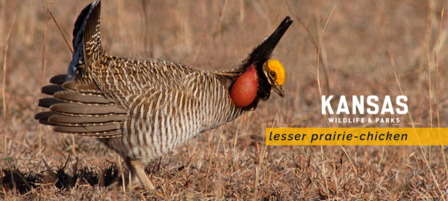Aerial Surveys to Document Lesser Prairie-Chicken Population Trends

For Immediate Release:
March 18, 2022
Contacts:
Nadia Reimer CMP®, KDWP Chief of Public Affairs
(785) 338-3036
nadia.reimer@ks.gov
Bill Van Pelt, WAFWA Grassland Coordinator
(623) 236-7573
bill.vanpelt@wafwa.org
EMPORIA – Aerial surveys for lesser prairie-chickens will begin March 23 and run through mid-May in five states containing lesser prairie-chicken habitat, including Kansas. The surveys are conducted annually by the Western Association of Fish and Wildlife Agencies (WAFWA) to document population trends and determine how the species is responding to habitat management strategies identified in the Lesser Prairie-Chicken Range-wide Conservation Plan.
The surveys will be conducted by helicopter in locations chosen randomly within the lesser prairie-chicken range, which in Kansas includes most of the western third of the state. Initial results from this year’s surveys will be available near July 1.
The range-wide conservation plan (https://wafwa.org/initiative-programs/lesser-prairie-chicken/) is a collaborative effort of WAFWA and the state wildlife agencies of Kansas, Texas, New Mexico, Oklahoma, and Colorado. It was developed to ensure conservation of the lesser prairie-chicken with voluntary cooperation of landowners and industry. The plan allows agriculture producers and industry to continue operations while reducing impacts to the bird and its grassland habitat.
For more on prairie chickens in Kansas, visit https://ksoutdoors.com/Hunting/Upland-Birds/Greater-and-Lesser-Prairie-Chicken.
To view the Lesser Prairie Chicken Range-wide Conservation Plan in detail, visit https://wafwa.org/initiative-programs/lesser-prairie-chicken/.
###
Since 1922, the Western Association of Fish and Wildlife Agencies (WAFWA) has advanced conservation in western North America. Representing 23 western states and Canadian provinces, WAFWA’s reach encompasses more than 40 percent of North America, including two-thirds of the United States. Drawing on the knowledge of scientists across the West, WAFWA is recognized as the expert source for information and analysis about western wildlife. WAFWA supports sound resource management and building partnerships at all levels to conserve wildlife for the use and benefit of all citizens, now and in the future.







